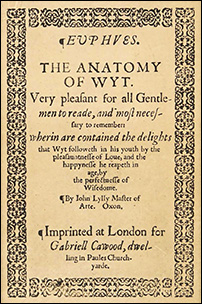|
|
|
|
 John Lyly John Lyly

from Euphues: The Anatomy of Wit
[Euphues Introduced]
by John Lyly
There dwelt in Athens a young gentleman of great patrimony, and
of so comely a personage, that it was doubted whether he were more bound to Nature for the lineaments
of his person, or to Fortune for the increase of his possessions. But Nature impatient of comparisons,
and as it were disdaining a companion or copartner in her working, added to this comeliness of his
body such a sharp capacity of mind, that not only she proved Fortune counterfeit, but was half of that
opinion that she herself was only current. This young gallant, of more with than wealth, and yet of
more wealth than wisdom, seeing himself inferior to none in pleasant conceits, thought himself superior
to all in honest conditions, insomuch that he deemed himself so apt to all things, that he gave himself
almost to nothing, but practicing of those things commonly which are incident to these sharp wits, fine
phrases, smooth quipping, merry taunting, using jesting without mean, and abusing mirth without measure.
As therefore the sweetest rose hath his prickle, the finest velvet his brack, the fairest flower his bran,
so the sharpest wit hath his wanton will, and the holiest head his wicked way. And true it is that some
men write and most men believe, that in all perfect shapes, a blemish bringeth rather a liking every way
to the eyes, than a loathing any way to the mind. Venus had her mole in her cheek which made her more
amiable: Helen her scar on her chin which Paris called cos amoris, the whetstone of love.
Aristippus his wart, Lycurgus his wen: So likewise in the disposition of the mind, either virtue is
overshadowed with some vice, or vice overcast with some virtue. Alexander valiant in war, yet given to
wine. Tully eloquent in his glozes, yet vainglorious: Solomon wise, yet too wanton: David holy but yet
an homicide: none more witty than Euphues, yet at the first none more wicked. The freshest colors
soonest fade, the teenest razor soonest turneth his edge, the finest cloth is soonest eaten with moths,
and the cambric sooner stained than the coarse canvas: which appeared well in this Euphues, whose wit
being like wax apt to receive any impression, and having the bridle in his own hands, either to use the
rein or the spur, disdaining counsel, leaving his country, loathing his old acquaintance, thought either
by wit to obtain some conquest, or by shame to abide some conflict, and leaving the rule of reason,
rashly ran unto destruction. Who preferring fancy before friends, and his present humor, before honor
to come, laid reason in water being too salt for his taste, and followed unbridled affection, most pleasant
for his tooth. When parents have more care how to leave their children wealthy than wise, and are more
desirous to have them maintain the name, than the nature of a gentleman: when they put gold into the hands
of youth, where they should put a rod under their girdle, when instead of awe they make them past grace,
and leave them rich executors of goods, and poor executors of godliness, then it is no marvel, that the
son being left rich by his father's will, become retchless by his own will.
1578
 | to Works of John Lyly |
Site copyright ©1996-2025 Anniina Jokinen. All Rights Reserved.
Created by Anniina Jokinen on August 8, 1996. Last updated on April 20, 2025.
|
|
The Tudors
King Henry VII
Elizabeth of York
King Henry VIII
Queen Catherine of Aragon
Queen Anne Boleyn
Queen Jane Seymour
Queen Anne of Cleves
Queen Catherine Howard
Queen Katherine Parr
King Edward VI
Lady Jane Grey
Queen Mary I
Queen Elizabeth I
Renaissance English Writers
Bishop John Fisher
William Tyndale
Sir Thomas More
John Heywood
Thomas Sackville
John Bale
Nicholas Udall
John Skelton
Sir Thomas Wyatt
Henry Howard
Hugh Latimer
Thomas Cranmer
Roger Ascham
Sir Thomas Hoby
John Foxe
George Gascoigne
John Lyly
Thomas Nashe
Sir Philip Sidney
Edmund Spenser
Richard Hooker
Robert Southwell
Robert Greene
George Peele
Thomas Kyd
Edward de Vere
Christopher Marlowe
Anthony Munday
Sir Walter Ralegh
Thomas Hariot
Thomas Campion
Mary Sidney Herbert
Sir John Davies
Samuel Daniel
Michael Drayton
Fulke Greville
Emilia Lanyer
William Shakespeare
Persons of Interest
Visit Encyclopedia
Historical Events
Field of the Cloth of Gold, 1520
Pilgrimage of Grace, 1536
The Babington Plot, 1586
The Spanish Armada, 1588
Elizabethan Theatre
See section
English Renaissance Drama
Images of London:
London in the time of Henry VII. MS. Roy. 16 F. ii.
London, 1510, the earliest view in print
Map of England from Saxton's Descriptio Angliae, 1579
Location Map of Elizabethan London
Plan of the Bankside, Southwark, in Shakespeare's time
Detail of Norden's Map of the Bankside, 1593
Bull and Bear Baiting Rings from the Agas Map (1569-1590, pub. 1631)
Sketch of the Swan Theatre, c. 1596
Westminster in the Seventeenth Century, by Hollar
Visscher's Panoramic View of London, 1616. COLOR
|
|